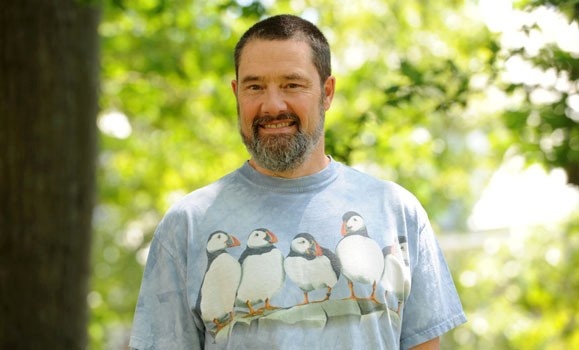Given that he teaches evolutionary history, Alan Pinder is no stranger to how things change over time. But heÔÇÖs still a bit surprised, looking back at his career, that he now finds himself taking on the role as chair of Senate, the universityÔÇÖs primary academic governing body.
ÔÇ£Look around this office: how much reading do you see on governance?ÔÇØ he says with a laugh, gesturing at the piles of Biology books that line the walls of his Life Sciences Centre office. ÔÇ£ItÔÇÖs not my experience, so itÔÇÖs somewhat intimidating, but IÔÇÖm building on a lot of great work done in recent years.ÔÇØ
Dr. Pinder is no stranger to Senate, of course. He just completed a three-year term as vice-chair, student affairs, a role that oversees the non-program elements of DalÔÇÖs academic experience. That includes everything from plagiarism policies to student accommodation, from course evaluations to academic discipline procedures. Prior to that, he served as a Faculty of Science representative and sat on SenateÔÇÖs Nominating and Discipline Committees. ┬á
Learn more:
I came back from sabbatical and there was an opening for the Faculty of Science I was told it was an opportunity for me, and it sounded interesting, he says. I knew Senate was the senior academic decision-making body at the university, but otherwise I didnt know much about it, which is probably the same as a lot of people at Dal. And from there, if they find youre willing to get involved, people start to take notice.
The value of governance
Since then, heÔÇÖs developed a great appreciation and respect for Senate and its work. SenateÔÇÖs membership includes more than 50 faculty representatives, seven student reps and the universityÔÇÖs academic administrative leadership. At times, grey areas can emerge between the responsibilities of Senate and the administration ÔÇö ÔÇ£Senate sometimes is taken to task for things that arenÔÇÖt part of our jurisdiction,ÔÇØ notes Dr. Pinder, ÔÇ£and sometimes administration is seen as responsible for things that are actually Senate policiesÔÇØ ÔÇö but itÔÇÖs through SenateÔÇÖs eight standing committees that faculty senators make decisions that shape and set directions for DalÔÇÖs programs and academic life in general at the university.
ÔÇ£The value [of Senate] is the faculty can govern, to a large extent, what we do,ÔÇØ explains Dr. Pinder, who in his role as chair oversees the agenda and overall function of Senate. ÔÇ£The faculty bring forward much of the programs, the research directions, the academic policies that we have here at ╣¹¢┤╩ËãÁ. We may not always agree with our individual faculty colleagues across the hall or across campus, but we do have a say in the general direction of the university.ÔÇØ
He says the biggest challenge is making sure faculty appreciate and understand the role they play in how decisions are made at the university.
ÔÇ£I see this as an important part of what faculty should spend time on,ÔÇØ he says. ÔÇ£ItÔÇÖs often something people donÔÇÖt have time for, unfortunately, because there are so many other demands on time. But if we want faculty to be self-governing, if we want faculty to have a major hand in making decisions at the university, then you have to be willing to get involved.ÔÇØ
A career in evolution
Similar to his transition into Senate, Dr. PinderÔÇÖs teaching and research has undergone its own evolution during his 26 years at Dal, moving from studying the respiratory physiology of vertebrates and into the realm of marine biology. (HeÔÇÖs currently undergraduate program coordinator of DalÔÇÖs Marine Biology program.)
ÔÇ£IÔÇÖve 'gone marineÔÇÖ relatively recently,ÔÇØ he explains. ÔÇ£I was working on amphibians, and then started breeding them, looking at juvenile stages and early developmental stages ÔÇö including eggs ÔÇö where diffusion is the only mechanism for exchange. Then from breeding amphibians I got into breeding fish, including Atlantic Salmon, then got into clownfish ÔÇö a marine reef fish ÔÇö and now IÔÇÖm doing research on coral reefs in Honduras.ÔÇØ
Serving as chair means his time with Senate will now increase to 60 per cent from its current 40 per cent as vice-chair. This means more time bringing faculty members together to come to key decisions ÔÇö but perhaps a little less time spent wearing his favourite fashions: an impressive collection of colourful T-shirts featuring all sorts of creatures, from turtles to puffins.
ÔÇ£[It comes] from being a biologist and preferring to wear T-shirts,ÔÇØ he says, with a smile. ÔÇ£And thereÔÇÖs a lot of really neat biology t-shirts out there, so why not use ÔÇÿem?ÔÇØ

